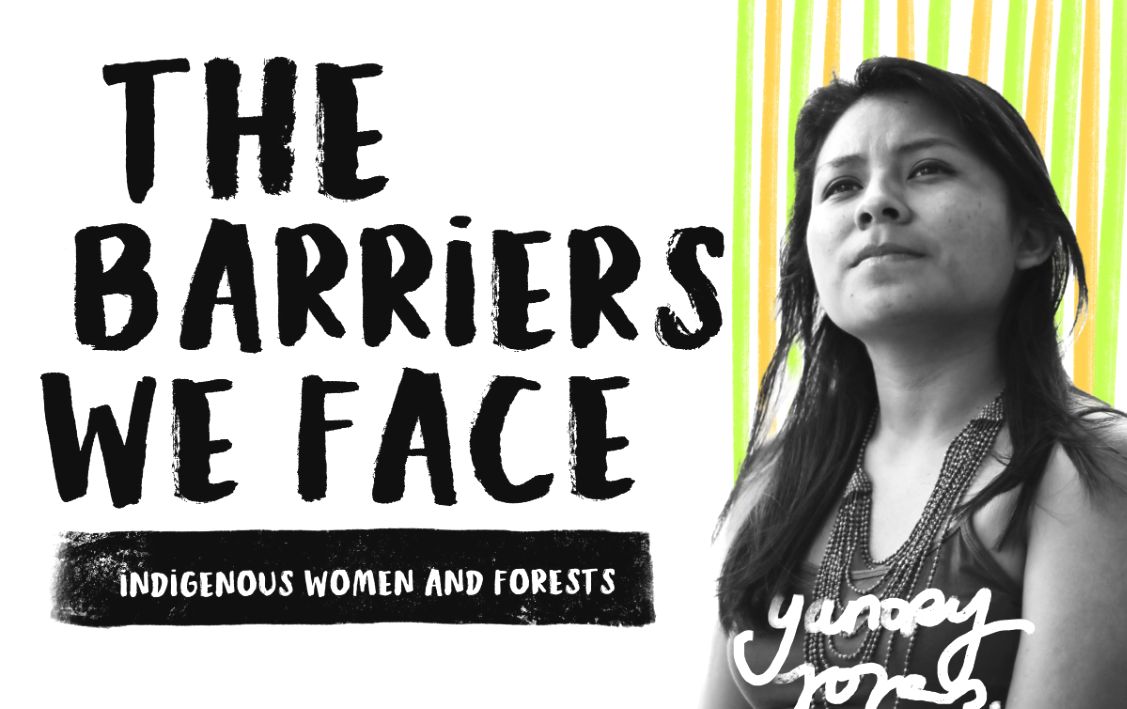
-
In a nutshell, can you tell us your story, where you grew up, what do you do now?
I was born and raised in a very small community, called Las Moras. Las Moras is one of the communities of the Boruca indigenous territory. In Costa Rica there are 24 indigenous territories, Boruca is one of them. My mom and dad are farmers and I'm the youngest of 11 siblings.
I started university when I was 17 years old. I have a degree in Anthropology. I lived in San Jose since the beginning of college. When I finished my studies, I started working as a consultant, providing expertise in different areas including intercultural education, communication, access to justice and environment. In 2021, I joined Costa Rica’sREDD + Results-Based Payment Project as an Indigenous Peoples Specialist.
-
What kind of barriers do you think young Indigenous women face today? Is there one in particular that has affected your personal journey or your community?
When we talk about young people it is complex to measure the existing diversity, even in a country as small as Costa Rica. That's why I like to talk about youth, Indigenous youth. Some of the barriers that we face are access to university education, academic offers and job opportunities.
To pursue this career, I had to leave my territory and live in the capital city, in a certain way leaving the base where my identity developed as an Indigenous woman. In the city I faced multiple forms of racism, which are exacerbated by being a woman, Indigenous and youth.
When I started working, the work environment was inclined to use the image of an Indigenous woman for tokenistic purposes, and not for the skills and qualifications that I had obtained, like having a Bachelor's degree and having in depth knowledge of an Indigenous territory.
Experiencing thist was a reality check for me, but at the same time it motivated me to support other Indigenous women, because my case is not isolated.
3. What can we learn from Indigenous women about the importance of forests? How do Indigenous women help protect forests in their Indigenous territories?
Indigenous women are the basis of the transmission of knowledge in Indigenous territories. It is the women who weave, know about medicinal plants, know about traditional foods, sow. And although we currently have a limited amount of land, we have the capacity to generate, in a very limited space, what is necessary to live.
We are also those who protect the areas with water sources, who take care of the trees and forest areas. This makes us fundamental in the survival of our identity, in addition to contributing to the development of our communities.
Indigenous women are the first to address risks due to climate change or disasters based on their unique knowledge. Tweet this.Even during the COVID-19 pandemic, women in Indigenous territories played a fundamental role because we measured its impact and generated strategies for to take care of our community. During this time the economy was hit hard, yet it was Indigenous women who mobilized internal products to guarantee food security, in addition to obtaining monetary resources.
I have learned from the elders that an understanding of collective work based on respect is essential. There is a strong tendency on the part of institutions or individuals to perceive themselves as "saviors of Indigenous Peoples" or to appropriate community processes, and that is when for me, our autonomy is really violated. Autonomy of decision, as well as the vision of Indigenous women.
That has been the difference in my approach to this work; coexistence with Indigenous sisters. Indigenous sisters know what they need better than anyone, and they work collectively to achieve advances that benefit their communities. They are extending networks of wisdom for collective well-being.
4. We often see that "Indigenous Knowledge" is not respected or recognized as a credible form of sustainable resource management. How can we overcome this situation and emphasize the knowledge of Indigenous women?
From my experience the first thing is visibility. Multiple initiatives led by women are being developed in Indigenous territories that do not have the same access as other organizations led by men. Telling these stories is essential to show the existence and work of Indigenous women, reflecting their daily lives and their voices.
The second thing for me is to redefine the elements of Indigenous Knowledge based on diversity. As stated earlier, not all Indigenous women are the same and they all have created their own ways in relation to their own realities. There are women who have dedicated themselves to be a part of organizational strengthening, of struggle for a territory, or the Indigenous production sector. These forms of adaptation to complex environments give us the opportunity to provide solutions from ancestrally transmitted knowledge, which is in turn systematized, lived and practiced.
Initiatives that work with Indigenous women must be accompanied precisely by the face of Indigenous women, not doing so, is to continue with the invisibility that generates a massive ignorance and the sharpening of stereotypes that do not recognize the contributions of women at the territorial, and even national, level. It is therefore essential to utilize the media, to reflect on these experiences. All this to say, the priority agenda of Indigenous women revolves around the right to territory, without this, we cannot continue to transfer our worldview to the next generations.
This interview was conducted by UNDP Climate & Forests, with support from the UN-REDD Programme.
UNDP Climate & Forests assists countries and stakeholders to implement the Paris Agreement by reducing deforestation, forest degradation and promoting sustainable development pathways.
UNDP Climate & Forests systematically promotes social equity, including the rights, knowledge, and inclusion of Indigenous Peoples and local communities, to ensure forest solutions to climate change contribute meaningfully to delivering on the NDCs and advancing the SDGs.
Yanory Rojas is an Indigenous Peoples Specialist with UNDP Costa Rica. Read her latest blog on biocultural rights of Boruca People here: https://www.climateandforests-undp.org/indigenousbioculture


